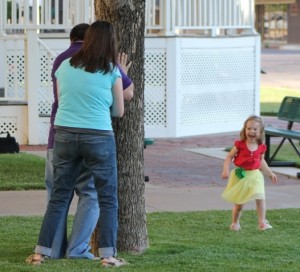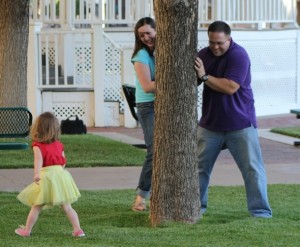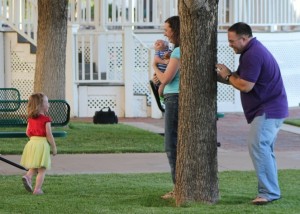 When it comes to relationships, are you a builder or a buster? I’ve known both, and I’m sure you have, too.
When it comes to relationships, are you a builder or a buster? I’ve known both, and I’m sure you have, too.
Relationship builders are liked. Respected. Trusted. They believe in the deep, abiding value of relationships with others, and invest their lives in nurturing them. But they also seem to go about relationship building in an almost-effortless way.
Relationship busters are different. They may get along with anybody for a season, but sooner or later their relationships tend to blow up or fall apart. Or they live in constant relationship drama.
One of the things I have learned about relationships is that a large part of them are an inside job. That is, there is a difference between the way builders and busters think. And whatever controls your thinking right now establishes the course of your relationships for a long time.
In his letter to the Colossians, Paul writes from a Roman prison and encourages them to engage in linking thinking:
Therefore, as the elect of God, holy and beloved, put on tender mercies, kindness, humility, meekness, longsuffering; bearing with one another, and forgiving one another, if anyone has a complaint against another; even as Christ forgave you, so you also must do” (Colossians 3:12-14, NKJV).
 Just as you put on clothes every day, Paul says there are some attitudes to clothe yourself with as well. Show me somebody who has a lifestyle of building relationships, and I’ll show you somebody who thinks like this:
Just as you put on clothes every day, Paul says there are some attitudes to clothe yourself with as well. Show me somebody who has a lifestyle of building relationships, and I’ll show you somebody who thinks like this:
1. Tender mercies – “I feel your pain.”
Relationship busters are needy and demanding. Or they are so absorbed in their own interests they have little time to sense the hurts of others.
Builders are different. They have the courage to explore the feelings of others, no matter how painful they may be. They pray for them. Explore ways to encourage them. Look for ways to understand others – particularly those they don’t particularly like.
Before you decide to write somebody off or holler for everybody else to identify with you, try some linking thinking. If you dare, ask God for a compassionate heart.
 2. Kindness – “How can I express love to you in a tangible way?”
2. Kindness – “How can I express love to you in a tangible way?”
Kindness is love expressed in tangible, actionable ways. It goes beyond yacking and promising and feeling sentimental. Kindness takes action.
“I need your advice,” Carrie said during her babysitting wizardry days. She showed me a piece of pink bubblegum with toothpicks protruding for legs and arms, and something fastened as little fake eyes. “I need to figure out how to make a mouth.”
This wasn’t an arts and crafts lesson. It was a lesson in kindness. Carrie was getting ready to go babysit for someone and wanted to actually do something with the kids. So she was making up a project to keep it interesting.
I’m still amazed. That’s linking thinking.
3. Humility – “Except for the grace of God, there goes I.”
Relationship busters think big. About themselves. They have an inflated view of their own importance, their own (self) righteousness, their own abilities.
About the same time Paul was writing the Colossians, he also wrote to the Philippians, encouraging them to “consider others as more important than themselves” (Philippians 2:3)
When you find yourself looking at somebody else’s failure and chirping, “I would never…,” be careful. When you find yourself jealous over someone else’s favor or uninterruptable by someone else’s needs or wants, you have entered the Buster Zone before you ever uttered the first word. Linking thinking looks at others as VIPs – even when they’re not your customers, your pet friends, or somebody you’re vainly trying to impress.
 4. Meekness – “I will listen first and make judgments later.”
4. Meekness – “I will listen first and make judgments later.”
This one can get me in trouble. When I find my “rights” being violated, my plans being thwarted, or my issues being ignored, it’s easy to start firing off snap judgments in my head.
At no time is it more important to control your thinking than when you can’t control other things or people. That driver in the Nissan Maxima in front of me at 10:01 yesterday (license plate available upon request) wasn’t deliberately trying to hang me up at yet another diabolically-designed Lubbock traffic light. I was just running late in my frenzied attempt to worship God in spirit and truth at church on time and that complete idiot was making me even later. How can you have Victory in Jesus at a traffic light?
Oh…where was I? Oh yeah, meekness. Disciplined, gentle conduct begins with disciplined, gentle thinking. And the emotional side of our brains doesn’t do that well. In the words of Stephen Covey, “seek first to understand, then be understood.”
5. Longsuffering – “We’re in a process. We’re just not there yet.”
Two Bible words for patience. One refers to enduring the little short-term irritations. The other word – the one mentioned here – has to do with patience for the long haul. Endurance. In classic English, “Love suffers long.”
 Linking thinking recognizes that relationships and the people behind them are a journey, and both take time. Love puts up with a lot because love sees the end of the journey.
Linking thinking recognizes that relationships and the people behind them are a journey, and both take time. Love puts up with a lot because love sees the end of the journey.
You don’t hear much about this kind of relationship endurance anymore, unless it’s from a shrink telling you how unhealthy it is. And yes, there is a unhealthy expression to this. But in an age where relationships are as disposable as that pizza box in your kitchen, isn’t it time to bring some long-haul thinking into yours? Think about it – If God is taking a lifetime to perfect you, can you start loving others as a work in progress as well? Oh, and one other thought before you decide you’ve had it with whomever… How about a little gratitude for the people who have suffered long with you? You’re not exactly Jesus in jeans yourself.
6. Bearing with one another – “Oh, he’s all right!”
Years ago I was on a construction site where a good-natured foreman started razzing a kid about his father. All in fun, but the foreman was baiting the kid to diss his dad. Finally the kid drawled, “Oh… he’s all right.” That pretty much ended the conversation, except for the foreman openly admiring somebody who “sticks up for his old man.”
Try this the next time you’re tempted to criticize, rage, or diss somebody who’s got your number. Say it slowly with a Southern drawl, and it has even better effect. “Oh… he/she’s all right.”
I love the phrase “bearing with one another” because it removes the mystical and the romantic from relationships, even in Church World. At the end of the day, they’re still people, and people can be a pain. Bear! Carry them, just as they bear with you.
7. Forgiving one another – “Christ forgave me of my great sin. I can forgive you of your small sin.”
Forgiveness takes place in the areas where patience, endurance, and putting up with people can’t fix it. Sometimes people are just sinfully painful. They wound, bruise, or offend, and neither you nor they can fix it because the wound can’t be “unwounded.” It’s then where it is profoundly helpful to remember that Jesus was wounded, too. By you. And He took the bruising pain of your inclination to reject Him.
Oh… and He prayed for your forgiveness before you ever came crawling back to Him. That’s linking thinking.
If you’re waiting for an apology or a change in behavior before you offer forgiveness, you don’t understand forgiveness very well. Forgiveness is a decision you make in your mind and heart before you ever act on it. And the same Christ who empowers you to live as one forgiven by His grace will also empower you to forgive the wounds of others. So I dare you… pray what He did… “Father, forgive them… and forgive me, even as I forgive those who have sinned against me.”
You can be sitting alone on your back porch as I am, watching the wind blow and listening to some church’s new carillon playing “Let There Be Peace on Earth.” Or you may be driving alone in a car (hope you’re not reading this while you do!). But even then, when you’re by yourself, you can be building relationships.
It’s amazing what a little linking thinking can do.

Yes! Finally someone writes about ведение группы вконтакте стоимость.
Reginald´s last blog post ..Reginald
Comments on this entry are closed.